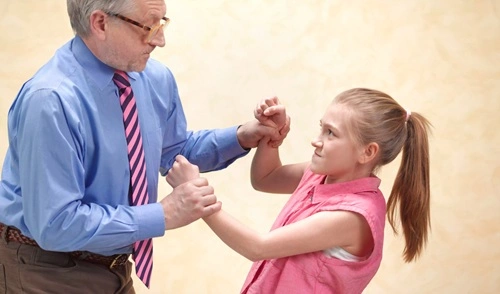Teaching is one of the most important professions in America, but it also comes with immense responsibility. Educators are trusted to guide, protect, and nurture students—not to harm them. When that trust is broken, the law steps in. In the United States, a teacher can absolutely go to jail for slapping a student, depending on the severity of the incident and the state’s specific laws. What may seem like a momentary lapse in judgment can quickly escalate into a criminal and professional disaster.

1. Slapping a Student Is Considered Assault
In the eyes of the law, slapping a student constitutes assault or battery—both criminal offenses. Assault is defined as the intentional use of force or violence against another person without their consent. Because teachers hold a position of authority and students are minors, the law treats such acts especially seriously.
For example:
- In California, Penal Code § 242 defines battery as “any willful and unlawful use of force or violence upon another person.”
- In Texas, Penal Code § 22.01 states that intentionally causing bodily injury or offensive physical contact is considered assault.
- In Florida, slapping a student could be charged as child abuse under Statute § 827.03, even if no visible injury is present.
Even a single slap, with or without injury, can meet these legal definitions—making the act criminally punishable.
2. Corporal Punishment: Legal but Limited in Some States
While most U.S. states have banned corporal punishment in schools, a few still allow it under limited circumstances. States such as Texas, Alabama, Mississippi, and Georgia permit corporal punishment if it’s considered “reasonable” and done in accordance with school policy.
However, the line between discipline and abuse is narrow. Even in states where physical discipline is technically legal, slapping a student on the face is almost always seen as excessive and abusive. If the action leaves a mark, causes pain, or is done in anger, it can result in criminal charges, loss of teaching credentials, and civil liability.
3. Possible Criminal Penalties
A teacher who slaps a student could face a range of criminal penalties, including:
- Misdemeanor assault or battery charges: Punishable by up to one year in jail, fines, and probation.
- Felony child abuse charges: If the slap results in injury or emotional trauma, penalties can include up to 5 years or more in prison.
- Loss of employment and certification: School districts and state licensing boards can immediately suspend or revoke teaching credentials following such incidents.
- Protective orders: A court may issue restraining orders preventing contact with the student or even with minors altogether.
Even if no physical injury occurs, the teacher can still face charges because physical contact meant to discipline or intimidate is prohibited in most states.
4. Mandatory Reporting and Investigations
Every school employee, from teachers to administrators, is considered a mandatory reporter under state law. That means any staff member who witnesses or suspects a teacher slapping a student is legally obligated to report it to Child Protective Services (CPS) or local law enforcement.
Once reported, an investigation begins—often involving school administrators, police, and social workers. The teacher may be placed on administrative leave during the investigation, and depending on the findings, could face criminal prosecution or civil lawsuits.
5. Civil and Professional Consequences
Beyond jail or fines, a teacher who slaps a student risks permanent damage to their career and reputation. Civil lawsuits from parents can seek compensation for:
- Emotional distress
- Pain and suffering
- Medical costs (if applicable)
- Punitive damages for misconduct
In addition, a criminal conviction for assault or child abuse almost always results in revocation of a teaching license, making it nearly impossible to work in education again.
6. The Safer Alternative: Positive Discipline
Modern education emphasizes non-physical, restorative forms of discipline, such as:
- Counseling and mediation
- Positive behavioral interventions
- Restorative justice programs
These approaches not only maintain classroom order but also uphold the child’s dignity and the teacher’s professionalism. Resorting to violence—no matter how brief—destroys trust and can end a teaching career overnight.
Final Thoughts
So, can a teacher go to jail for slapping a student? Yes—without question. Slapping a child is viewed as an act of violence, not discipline. The law protects students from physical harm and holds educators to the highest standards of conduct.
A single impulsive act can lead to criminal charges, jail time, loss of career, and lifelong stigma. Teachers must remember that their authority comes with responsibility—and that maintaining composure, not control through force, is what the law and the profession demand.
In short: a slap in the classroom can land a teacher in a courtroom.

Our dedicated team gathers information from all the reliable sources to make the law accessible and understandable for everyone. We provide the latest legal news stories from across the country, delivered straight to you.
